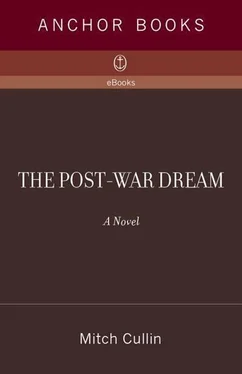Yet Hollis had no intention of discussing what was, in reality, the actual turning point — that December morning in which he stirred awake, bloodshot and hungover, and momentarily glimpsed the ghost of his own image: a duplicate Hollis standing at the end of his bed, arms hung rigidly at its sides, mirroring him in almost every way, with the same faded blue jeans, tan leisure shoes with rubber soles, bright blue Windbreaker, white T-shirt. No, he couldn't bring himself to tell Debra at last about the recurring specter now known as Max, how it frightened him away from binge drinking and continued to materialize in front of him throughout the years — at grocery stores, on city streets, among golf course greens — eventually growing older and more decrepit than its tangible counterpart, disappearing for prolonged periods only to reappear when least expected, as if to remind him who he was really meant to be: a figment cut adrift into the world without a person or a purpose to ground him.
Nevertheless, anything seemed probable once Hollis had become accustomed to the disquieting presence of his other self, little else would strike him as too fantastic or implausible from then on. A blizzard of frogs was no more unexpected than a lightning storm. A plague of flesh-eating locusts could have swept across Critchfield, devouring the entire town in minutes, and he wouldn't have blinked an eye. The next-door neighbor's Labrador retriever could have started whispering to him with Jack Benny's voice, the lengthy branches of sinister oak trees could have snatched unsuspecting children into the air as they were walking to school, gusts of wind could have tightened around the necks of Lions Club members like invisible nooses — and none of it would have fazed or startled him all that much; the mundane and the illogical, he had decided, were composed of identical properties.
But it wasn't important for Debra to learn that part of the story, especially now. Instead, Hollis spoke of a more relevant curiosity, mentioning another unforeseen entity which had made its way into Critchfield, seeking him out after his sobriety began: transported hundreds of miles — coming from the Panhandle of Texas to his home in Minnesota — ultimately landing inside the foyer on a snowy afternoon and staying there until, a short while later, he fetched it casually off the floor. What was lifted by his fingers instantly produced the kind of confusion and trepidation he felt when first encountering his doppelganger. He held a brown postcard-size envelope addressed to Mr. Hollis Adams and forwarded to him from the naval hospital in Oakland, with a handwritten return address reading: Bill McCreedy, County Road 14, Claude, Texas.
How can this be? Hollis thought, the envelope shaking in his hand. No, no, it isn't possible. Because he knew Creed was truly gone; he had witnessed those various facets of death — all possessing a distinct aura of completeness, each an unquestionable moment of terrible truth — and in less than the passing of a second, he had seen Creed eradicated with his own eyes, an image which was indelibly carved into his memory, something which couldn't be altered. Then he wondered if there might not be a second Creed revealing himself, just as there was now a second Hollis appearing before him from time to time — a creature or spook bearing similar characteristics yet seemingly inhuman. Much to his relief that didn't prove to be the case, although it was a second Bill McCreedy who had found him — or, rather, the original Bill McCreedy, as he quickly realized upon tearing open the envelope — one who had pre-dated the man he had met in the army, and, as it happened, who was also partly responsible for the creation of that Creed he had known and so disliked.
Within the envelope was a Christmas card depicting the black silhouettes of the Three Wise Men riding camels under a starry sky; inside the card was the printed sentiment of may the lord be with you during his blessed season — along with a folded piece of yellow paper containing a dollar and a short letter: Dear Son,The McCreedy Family hopes this finds you in improved health amp; doing well, and that you're enjoying the holidays in the comfort of your kin.We apologize for not writing you any sooner, but we weren't sure how to reach you until last week. As I'm sure you can understand, things have been difficult here. The service for our beloved son amp; brother Bill went very nice, and our faith amp; community has done much to tend to our grief. We draw great strength in knowing Billy's serving with the Lord, but not a day goes by that doesn't keep him square in our thoughts amp; prayers. We miss him so badly. Needless to say, you're in all our thoughts amp; prayers, too. Billy always spoke highly of you in his letters home. The sacrifice you made in trying to protect him means more to us than you can imagine.Please know that should you find yourself passing our way, you're always welcome to stay a spell with us. We'd enjoy getting to meet you, so consider it an open invite. Until then, if you catch a moment drop us a line and tell us how you're holding up. We'd appreciate hearing from you.Yours, in the Lord,Bill Sr., Florence, and Edgar McCreedy
P.S. The one buck isn't much, but we thought you might like a little walking around money for the holidays.
For every Bill Jr. — Hollis found himself thinking after finishing the letter — there ‘s a Bill Sr. He returned the card and letter to the envelope, slipping both it and the dollar into a back pocket. Already the surprise of receiving such a letter had vanished, replaced by the appeasing notion of at last having a connection outside of Critchfield. It didn't matter if it was McCreedy's family or not, just so long as Creed wasn't involved. It didn't matter if everyone regarded his war wound as a heroic sacrifice or a badge of honor. What did matter, though, was that now he had somewhere else to go, someplace new where he'd be welcomed by strangers as a friend. Prayers don't always get answered, he realized, but occasionally they do; and if the Lord was inclined to move in mysterious ways — so, too, would he.
The turning of the year was to mark a brand-new beginning. As Hollis told Debra, 1951 was to be a time for serious change, a time for him to make a clean go of things, disregarding much of what had previously shaped his life. That fresh start began early on the morning of January 2, when he rose in bed, brushing sleep off his eyelids, having become awake to what he thought was the sound of somebody crossing by the foot of his bed, walking quickly from the room and shutting the door behind. Sitting there, he listened for movement in the hall, but instead heard only birds just beyond the bay window. After a while he climbed to his feet and navigated the semi-darkness, presently dressing himself in front of the window where the pale outside light illuminated the curtains. Prior to sleeping he had washed, slicking and patting his hair, and he had also laid out the clothing he intended to wear the following morning — clean socks and underwear, a white cotton undershirt, gabardine slacks, a lightweight lumber jacket, and a green sweater he now pulled over his head. Then it was him crossing by the foot of his bed, holding the small brown suitcase he had packed the night before, walking resolutely from the room and quietly shutting the door behind.
Moments later, Hollis went gingerly through the almost silent downstairs, going past the doorway of his mother and stepfather's bedroom, catching their mismatched but equally voluminous snores coming from within, as the floorboards creaked beneath him despite efforts to step lightly. In the living room he noticed the Zenith radio had been left on — humming faintly with electricity, its orange light glowing — and an unfinished newspaper remained on the seat of Rich's black leather armchair (the same armchair where his stepfather would soon suffer a stroke, dying alone while listening to a broadcast of Toscanini conducting La Traviata , a newspaper across the man's lap like a blanket). When he pulled open the front door, sunlight poured into the foyer; ahead of him, in the yard, clumps of snow mingled with fallen leaves and the stems of dry grass. Whistling to himself, he bustled forward, hurrying down the porch steps, forgetting to lock the door before he went.
Читать дальше










![Theresa Cheung - The Dream Dictionary from A to Z [Revised edition] - The Ultimate A–Z to Interpret the Secrets of Your Dreams](/books/692092/theresa-cheung-the-dream-dictionary-from-a-to-z-r-thumb.webp)

